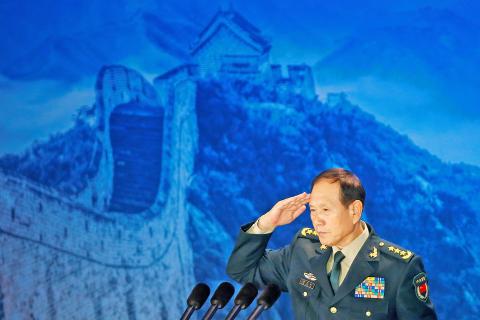The former commanding general of the US Army in Europe on Wednesday said it is very likely that the US will be at war with China in 15 years.
Retired lieutenant general Ben Hodges said that European allies would have to do more to ensure their own defenses in the face of a resurgent Russia, because the US would need to focus more attention on defending its interests in the Pacific Ocean.
“The United States needs a very strong European pillar. I think in 15 years — it’s not inevitable — but it is a very strong likelihood that we will be at war with China,” Hodges told a packed room at the Warsaw Security Forum, a two-day gathering of leaders, and military and political experts from central Europe.

Photo: AP
“The United States does not have the capacity to do everything it has to do in Europe and in the Pacific to deal with the Chinese threat,” he said.
Hodges commanded the US Army in Europe from 2014 until last year; he now is a strategic expert with the Center for European Policy Analysis in Washington.
Despite Washington’s shifting geopolitical priorities, Hodges said that the US’ commitment to NATO remains “unshakable.”

Photo: Reuters
Hodges later told reporters that a recent near-miss between a US Navy destroyer and a Chinese warship in the South China Sea was only one of the signs pointing to “an increasingly tense relationship and increasing competition in all the different domains.”
Others are China’s “constant stealing of technology” and how China is gaining control of infrastructure by funding projects in Africa and Europe, he said, noting that China owns more than 10 percent of the ports in Europe.
In Beijing, Chinese Minister of National Defense General Wei Fenghe (魏鳳和) yesterday warned that any effort to challenge China’s authority over Taiwan was “extremely dangerous.”
“Taiwan is China’s core interest. On these issues, it’s extremely dangerous to challenge China’s bottom line repeatedly. If anyone tries to separate Taiwan from China, China’s military will take action at all costs,” he at the start of the Beijing Xiangshan Forum, a regional military gathering.
He also called on US leaders to drop what he said was a “Cold War mentality.”
Wei, who met with US Secretary of Defense James Mattis on Friday last week at the Shangri-la Dialogue in Singapore, said military facilities were needed to protect Chinese interests in the South China Sea.
“The South China Sea situation is stabilizing, which proves that all countries can take care of their own affairs,” Wei said.
“China opposes countries that come to the South China Sea from outside of the region in the name of freedom of navigation to show force and provoke, which leads to rising tensions,” he said.
Destroyers from US and Chinese navies nearly collided in the area last month during a US “freedom-of-navigation operation” to challenge what it says are illegal territorial claims by China and its neighbors.
Wei said China had no interest in engaging in an arms race.
He also denounced claims by US President Donald Trump’s administration that the Chinese government was attempting to meddle in the US midterm elections, saying the accusations had “severely damaged” ties.
“It has been proven that a hegemonic and confrontational security model is outdated,” Wei said. “The world shouldn’t repeat the Cold War. All countries should respect each other’s sovereignty, security and development rights.”

SECURITY: As China is ‘reshaping’ Hong Kong’s population, Taiwan must raise the eligibility threshold for applications from Hong Kongers, Chiu Chui-cheng said When Hong Kong and Macau citizens apply for residency in Taiwan, it would be under a new category that includes a “national security observation period,” Mainland Affairs Council (MAC) Minister Chiu Chui-cheng (邱垂正) said yesterday. President William Lai (賴清德) on March 13 announced 17 strategies to counter China’s aggression toward Taiwan, including incorporating national security considerations into the review process for residency applications from Hong Kong and Macau citizens. The situation in Hong Kong is constantly changing, Chiu said to media yesterday on the sidelines of the Taipei Technology Run hosted by the Taipei Neihu Technology Park Development Association. With

CARROT AND STICK: While unrelenting in its military threats, China attracted nearly 40,000 Taiwanese to over 400 business events last year Nearly 40,000 Taiwanese last year joined industry events in China, such as conferences and trade fairs, supported by the Chinese government, a study showed yesterday, as Beijing ramps up a charm offensive toward Taipei alongside military pressure. China has long taken a carrot-and-stick approach to Taiwan, threatening it with the prospect of military action while reaching out to those it believes are amenable to Beijing’s point of view. Taiwanese security officials are wary of what they see as Beijing’s influence campaigns to sway public opinion after Taipei and Beijing gradually resumed travel links halted by the COVID-19 pandemic, but the scale of

A US Marine Corps regiment equipped with Naval Strike Missiles (NSM) is set to participate in the upcoming Balikatan 25 exercise in the Luzon Strait, marking the system’s first-ever deployment in the Philippines. US and Philippine officials have separately confirmed that the Navy Marine Expeditionary Ship Interdiction System (NMESIS) — the mobile launch platform for the Naval Strike Missile — would take part in the joint exercise. The missiles are being deployed to “a strategic first island chain chokepoint” in the waters between Taiwan proper and the Philippines, US-based Naval News reported. “The Luzon Strait and Bashi Channel represent a critical access

Pope Francis is be laid to rest on Saturday after lying in state for three days in St Peter’s Basilica, where the faithful are expected to flock to pay their respects to history’s first Latin American pontiff. The cardinals met yesterday in the Vatican’s synod hall to chart the next steps before a conclave begins to choose Francis’ successor, as condolences poured in from around the world. According to current norms, the conclave must begin between May 5 and 10. The cardinals set the funeral for Saturday at 10am in St Peter’s Square, to be celebrated by the dean of the College